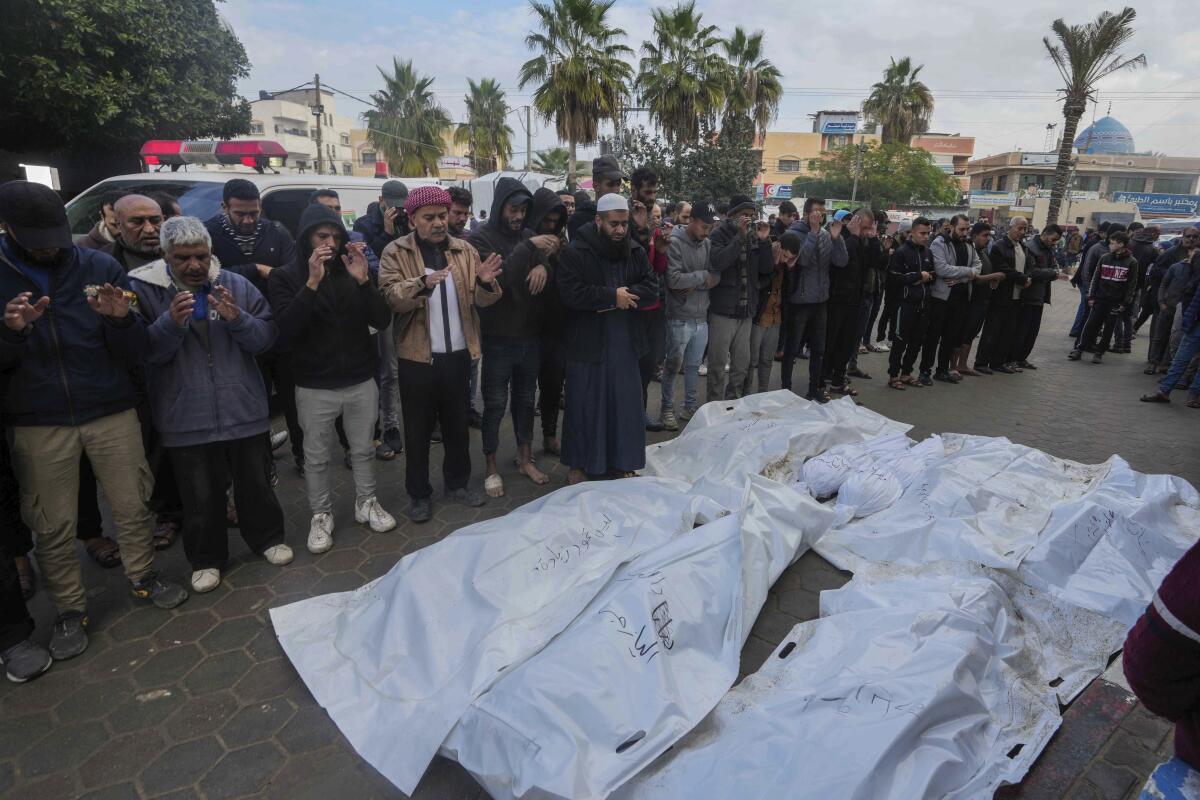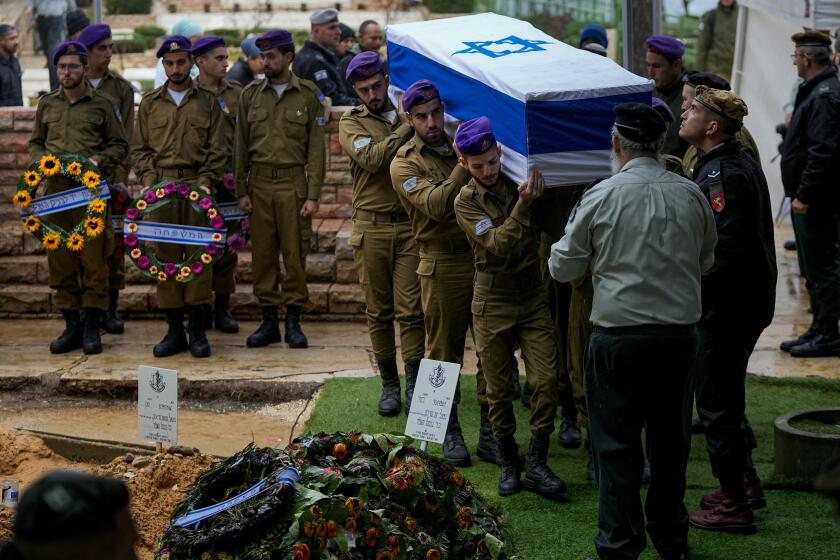Egypt floats plan to end Israel-Hamas war. The proposal gets a cool reception

- Share via
CAIRO — Israel and Hamas on Monday gave cool public receptions to an Egyptian proposal to end their bitter war. But the long-standing enemies stopped short of rejecting the plan altogether, raising the possibility of a new round of diplomacy to halt a devastating Israeli offensive in the Gaza Strip.
The Egyptian plan calls for a phased hostage release and the formation of a Palestinian government of experts to administer the Gaza Strip and occupied West Bank, according to a senior Egyptian official and a European diplomat familiar with the proposal.
The Egyptian official, speaking on condition of anonymity to discuss the proposal, said the details were worked out with the Persian Gulf nation of Qatar and presented to Israel, Hamas, the United States and European governments. Egypt and Qatar mediate between Israel and Hamas, while the U.S. is Israel’s closest ally and a key power in the region.
Israeli Prime Minister Benjamin Netanyahu, who visited soldiers in northern Gaza on Monday, did not comment directly on the proposal. But speaking to members of his Likud Party, he said he was determined to press ahead with Israel’s offensive, launched in response to an Oct. 7 Hamas attack on southern Israel that killed at least 1,200 people, mostly civilians, and took 240 others hostage.
“We are expanding the fight in the coming days, and this will be a long battle and it isn’t close to finished,” he said.
Hamas has continued to fire rockets into Israel throughout the fighting. Late Monday, the militant group launched a barrage of rockets, triggering air-raid sirens in the southern city of Ashkelon. AP video showed what appeared to be several interceptions by Israel’s missile defense system. There were no immediate reports of damage or injuries.
The Egyptian proposal falls short of Israel’s declared goal of crushing Hamas. It also appears to be at odds with Israel’s insistence on maintaining military control over Gaza for an extended period after the war.
But Netanyahu faces heavy domestic pressure to reach a deal to bring home the more than 100 Israelis who remain in captivity in Gaza after their Oct. 7 kidnapping.
As Netanyahu vowed to continue the war during a speech in parliament, relatives of the hostages interrupted him and called for their immediate return. “Now! Now!” they shouted.
The rising death toll of Israeli soldiers in the ground operation also threatens to undermine what has been broad public support for the war. The Israeli military announced the deaths of two more soldiers Monday, bringing the total killed in the war to 156.
Hamas did not officially react to the proposal. It remained unclear whether the Palestinian militant group would agree to relinquish power after controlling Gaza for the last 16 years.
Izzat Rishq, a senior Hamas official who is believed to be based in Qatar, issued a statement repeating the group’s position that it will not negotiate without a “complete end to the aggression.” He said Hamas would not agree to a “temporary or partial truce for a short period of time.”
Word of the proposal came as Israeli airstrikes heavily pounded central and southern Gaza. In the Maghazi refugee camp, rescue workers were still pulling bodies from the wreckage hours after a strike that killed at least 106 people, according to hospital records seen by the Associated Press — one of the deadliest of Israel’s air campaign.
The Israeli military says 15 soldiers were killed in some of the bloodiest days since its ground offensive started. Thousands of Palestinians have died in the war.
The war has devastated large parts of Gaza, killed more than 20,600 Palestinians and displaced almost all of the territory’s 2.3 million people. United Nations officials warn that a quarter of the population is starving under Israel’s siege of the territory, which allows only a trickle of supplies in. Arriving aid trucks often are met by crowds of desperate people who in some cases have looted boxes of food and water.
In the southern Gaza Strip, Hamas admitted to shooting dead a 13-year-old boy who was among a group of people who tried to seize aid from a truck. The shooting prompted a violent protest and rare public criticism of Hamas, which has shown little tolerance for dissent during its rule.
Enraged relatives of the slain boy, Ahmed Brikeh, attempted to attack a police station. A relative, Mosaad Brikeh, blamed Hamas for the killing in video comments circulated on social media, accusing the policeman of shooting the boy “directly in his head.”
He said the family previously cooperated with Hamas to secure the border area with Egypt. He called for the policeman to be held accountable, warning the family would prevent “any vehicles” from passing through the area.
The Egyptian proposal seeks to not only end the fighting but also to lay out a plan for the day after.
It calls for an initial cease-fire of up to two weeks during which Palestinian militants would free 40 to 50 hostages, among them women, the sick and the elderly, in return for the release of 120 to 150 Palestinians from Israeli prisons, the Egyptian official said.
At the same time, negotiations would continue on extending the cease-fire and the release of more hostages and bodies held by Palestinian militants, he said. Israeli officials estimate that 20 of the hostages have died or been killed in captivity.
Egypt and Qatar also would work with all Palestinian factions, including Hamas, to agree on the establishment of a government of experts, he said. The government would rule Gaza and the West Bank for a transitional period as Palestinian factions settle their disputes and agree on a road map to hold presidential and parliamentary elections, he added.
In the meantime, Israel and Hamas would negotiate a comprehensive “all-for-all” deal, he said. This would include the release of all remaining hostages in return for all Palestinian prisoners in Israel, as well as the Israeli military’s withdrawal from Gaza and the Palestinian militants’ halting of rocket attacks into Israel. More than 8,000 Palestinians are held by Israel on security-related charges or convictions, according to Palestinian figures.
Some have been convicted in deadly attacks on Israelis. While their release would be controversial, Israel has a history of agreeing to lopsided releases, including a deal in 2011 that freed more than 1,000 prisoners for a single Israeli soldier held captive in Gaza. Those prisoners included Yahya Sinwar, Hamas’ leader in the Gaza Strip.
Egyptian Foreign Minister Sameh Shoukry spoke by phone Monday with Iran’s chief diplomat, Hossein Amirabdollahian, on the war in Gaza, the Egyptian Foreign Ministry said. The statement said Shoukry briefed Amirabdollahian about efforts to achieve a comprehensive cease-fire. It didn’t offer further details. Iran is a major supporter of Hamas.
In Washington, the White House declined to comment about the Egyptian proposal.
U.S. officials remain in close contact with Egypt and Qatar about getting more hostages released and several proposals have been floated, according to a person familiar with the talks. Athough the Egyptian proposal is viewed as a positive sign, there’s a large measure of skepticism that it will result in a breakthrough, the person said, speaking on condition of anonymity to discuss behind-the-scenes diplomacy.
Israel’s offensive has been one of the most devastating military campaigns in recent history. More than two-thirds of the more than 20,600 Palestinians killed have been women and children, according to the Hamas-run Health Ministry in Gaza, which does not differentiate between civilians and combatants among the dead.
Sunday night’s strike in the Maghazi camp leveled a three-story building and damaged neighboring ones. On Monday, first responders and residents, some digging with bare hands, pulled dozens more bodies out of the rubble.
At Al Aqsa Martyrs Hospital in nearby Deir al Balah, men prayed over several dozen bodies laid out on the ground. Sobbing relatives peeled open body bags to get a last look or kiss the face of a loved one. One man wept as he hugged a child-sized body wrapped in bloody plastic sheeting.
Another man knelt over the body of a relative, screaming, “I swear to God, he was a man! I swear to God, he was better than the whole of Hamas!”
The bodies of 80 more people killed in other strikes across central Gaza were brought to the hospital from late Sunday to early Monday, hospital records showed.
Since Friday, 17 Israeli soldiers have been killed in combat, most in southern and central Gaza — an indication of the heavy fighting in and around the southern city of Khan Yunis.
Late Monday, the Israeli army said it had discovered the stolen car of the family of an Israeli hostage, Samer al-Talalka, in a hospital compound in northern Gaza. Al-Talalka was among three hostages mistakenly shot dead by Israeli soldiers in Gaza this month.
Israelis still largely stand behind the war against Hamas. But there has been widespread anger against Netanyahu’s government, which many criticize for failing to protect civilians on Oct. 7 and promoting policies that allowed Hamas to gain strength over the years. Netanyahu has declined to accept responsibility for military and policy failures.
In northern Gaza, Palestinians reported heavy Israeli bombardment and gunfire in the urban refugee camp of Jabaliya, an area Israel had claimed to control. The Israeli military has said it completed the dismantling of Hamas’ underground headquarters in northern Gaza.
Israel faces international criticism for the civilian death toll, but it blames Hamas, citing the militants’ use of crowded residential areas and tunnels. Israel says it has killed thousands of Hamas militants.
Jobain reported from Rafah, Gaza Strip, and Lidman from Tel Aviv.
More to Read
Sign up for Essential California
The most important California stories and recommendations in your inbox every morning.
You may occasionally receive promotional content from the Los Angeles Times.














